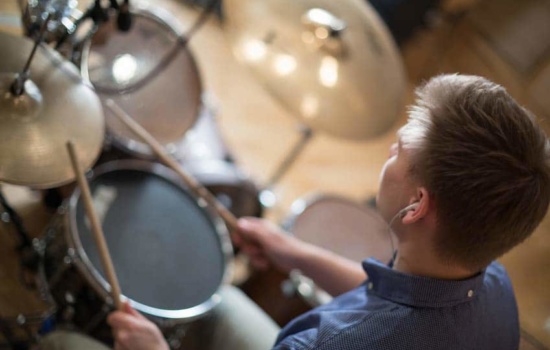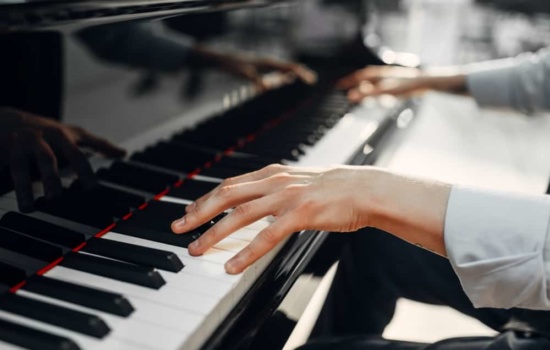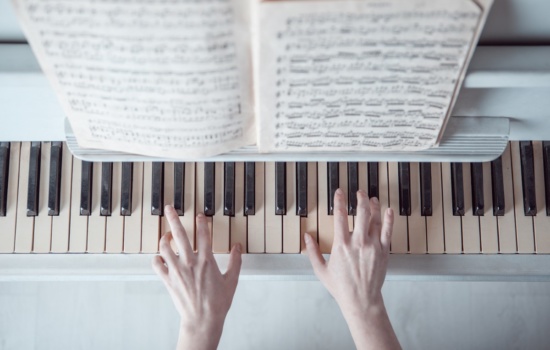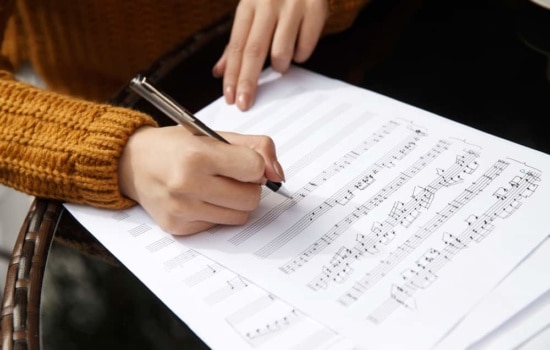Music Career Finder
Survey Start
Pianist
Career Overview
A Pianist is a musician who plays the piano and other keyboard instruments, providing harmonic, rhythmic, and melodic elements in music, whether playing solo or as part of an ensemble, band, or orchestra.
Alternate Titles
Piano Player, Keyboardist
Avg. Salary
$50,9341
Salary Range
$31K-$88K1

How To Become a Pianist
- A pianist plays piano in concerts and on others’ recordings
- The main career paths for a pianist include performing, playing on others’ recordings, composing/arranging music, and teaching piano
- Aspiring pianists must know how to read sheet music, be adaptable, work well with others, and practice regularly
- The average salary for a professional pianist is $54,282 per year and ranges from $26,500 to $143,000 per year
- Career Description
- Salary
- Career Outlook
- Career Path
- Experience & Skills
- Education & Training
- Sources
- References
Career Description
A pianist is a musician and artist who performs in concerts and contributes to recordings, whether working alone or in an ensemble or orchestra.
What Does a Pianist Do?
According to the professional pianists we interviewed, here is what a pianist may do:
- Practicing piano (especially if they have a concert coming up)
- Answering emails
- Sending files of piano recordings to music industry people
- Planning programs and concert events
- Teaching piano
- Playing concerts
Salary
The average salary for a professional pianist is $54,282 per year and usually ranges from $26,500 to $143,000 per year1.
This is pretty accurate, according to Dominic Cheli (Soloist, Winner of the 2017 Music Academy of the West Concerto & Concert Artists Guild Competitions).
He said $50,000 a year is about what you can expect to make, but he said that your salary could “really skyrocket.”
“There’s no point where the progress stops,” he said. “It’s not all about money, of course, but it’s nice to know that you and your art appreciate as a commodity.”
How Do Pianists Make Money?
Pianists are generally self-employed, even if they have a management team in place. However, there are few salaried positions for pianists at some orchestras and schools.
Here are the different ways pianists can make money:
- Working as an accompanist (AKA collaborative pianist)
- Concert performances (solo or with an ensmble or orchestra)
- Royalties from their original songs
- Royalties from recordings of original and cover songs
- Composing and arranging music for films, TV, or video games
- Performing at weddings, corporate events, nightclubs, or other general business-type occasions
Hey, what do you think about trying our new Music Career HelperMusic Career Helper really quick? It’s totally free and could help get your career moving fast! Give it a try. It’s totally free and you have nothing to lose.
Career Outlook
Like any career in the performing arts, becoming a successful pianist takes years of hard work, dedication, persistence, and of course, some luck.
But whether working as a cocktail pianist, a keyboardist in a rock group, or a concert pianist, there will always be a strong demand for talented pianists who really know their stuff. Playing exceptionally well is certainly a prerequisite, and can take years to achieve. And taking care of the business side of things is also a must.
There’s an incredible variety of musical styles that call for piano, and the players who can cover many styles have the most opportunities to perform.
On the other end of the spectrum, being the very best at any one style can also open doors to plenty of opportunities.
The pianists with the busiest schedules tend to be one or the other.
Career Path
Most pianists start early and take private lessons from a piano teacher. However, that doesn’t mean you can’t start playing piano when you’re older.
Regardless, to succeed as a pianist, you will need to spend hours practicing scales, sight-reading, and playing others’ songs.
Once you have developed and honed your skills, here are the main career paths you can take as a pianist…
Performing Pianist
You can perform at solo concerts, play with an orchestra or chamber group, or join a band. You can also play piano for singers and choirs.
You’ll end up working evenings and weekends because that’s when musical performances usually take place.
Session Pianist
A session pianist records piano on others’ songs, albums, film scores, or other media projects. To do this, you’ll need to know how to play in many different styles, and you may have to be able to record parts on your own from a home studio.
Composer/Arranger
As a music composer, you would write and possibly record songs for piano or other ensembles. This could be for an orchestra to play or to be used in a film, TV show, video games, or other visual media.
An arranger takes what a composer has written and adapts it for different ensembles to perform. It could involve simplifying pieces for students or reinterpreting works in different styles.
Piano Teacher
You can become a private piano teacher, showing students of all ages the basics of playing piano and reading sheet music.
In addition or instead of that, you can teach music in a school, whether piano specifically or as a general music teacher. If you want to earn your master’s or doctorate, you could also become a university music professor.
Out of these four career paths, this is the only one that is often an employee position — the others almost always involve being freelance/self-employed.
Experience & Skills
According to the expert pianists we interviewed, here are the main skills and experience you’ll need to succeed…
Sight-Reading
If you don’t know how to read sheet music, you will be lost. A successful pianist has to know how to sight-read. You may sometimes have to play a piece of music with short notice, and knowing how to read music will allow you to do that.
Flexibility/Adaptability
You will work with many different people, be asked to play in different styles, and be ready for any kind of piano-related job to make ends meet.
Be Social
Succeeding as a pianist is not just about being great at your instrument. It’s about who you know and who likes you. You have to be pleasant to work with or else no one will want to work with you.
Develop a Practice Routine
Even after you become accomplished on the piano, you must keep practicing. There’s always room for improvement. And a practice routine can help you always get better.
Have Discipline
The discipline to practice every day, constantly seek out work, and work well with others requires a passion for playing piano.
Education & Training
Some pianists go to college for music, music education, or performance, and others just work with a piano teacher.
If you want to teach music or piano at a school, you will need to earn a formal education, usually a doctorate or master’s.
Whether or not you go to music school, you must have proper training. You need to learn the basics of piano and sight-reading.
“You absolutely need to have training,” Broberg said.
“That’s the main thing. Pretty much everybody in our field goes to college and does that. But the most important thing is finding the right Teacher. It’s not about what school you go to.”
Pianist Degree
If you decide that a music degree is right for you and your career goals, the best options to pursue are:
- Bachelor of Music (B.M.) in Piano Performance
- Bachelor of Arts (B.A.) in Music
- Bachelor of Music Education (B.M.E.)
- Bachelor of Fine Arts (B.F.A.) in Music
- Bachelor of Science (B.S.) in Music Technology or Music Production
Sources
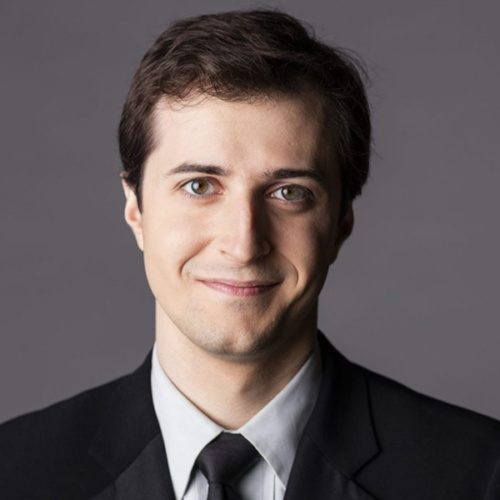
Kenny Broberg
American Pianist Kenny Broberg continues to build a reputation as “one of the most intelligent and intense artists on the concert stage today” (Theater Jones) with fresh interpretations complemented by a natural, honest stage presence. The Minneapolis native first came to international attention when he captured the silver medal at the 2017 Van Cliburn International Piano Competition with performances marked by “an imaginative shaping of themes, revelation of inner voices, and an unfailing sense of momentum” (Texas Classical Review). He followed this with a bronze medal win at the 2019 International Tchaikovsky Competition, adding to previous prizes at the Hastings, Sydney, Seattle, and New Orleans International Piano Competitions.
Kenny has performed across Europe, Asia, Australia, and North America, and worked with such esteemed Conductors as Ludovic Morlot, Kent Nagano, Leonard Slatkin, Vasily Petrenko, Nicholas Milton, John Storgårds, Carlos Miguel Prieto, and Stilian Kirov. He has collaborated with the Royal Philharmonic, Minnesota, Kansas City Symphony, Sydney Symphony, Seattle Symphony, Fort Worth Symphony, and the Louisiana Philharmonic Orchestras, among others.
Lauded for “the ability to build a strikingly imaginative and intelligent program… [leading] his audience through a superbly conceived, brilliantly executed journey” (Theater Jones), Kenny enjoys juxtaposing the novel and familiar, bringing light to lesser-known works alongside classic repertoire. Recent and upcoming highlights include his Spivey Hall debut; a tour of rural Australian communities, along with a return to Sydney; residencies at the Mariinsky International Piano, Stars on the Baikal, Strings, and Sunriver Music Festivals; and recitals in Yokohama, Nagoya, Moscow, New York, and Los Angeles.
He has been featured on NPR, WQXR, APM’s Performance Today, MPR, and ABC (Australia) radio. In 2019, Kenny appeared at the Texas Medal of Arts Awards Gala, performing for honorees including Matthew McConaughey and Jennifer Holliday; he is also a finalist for the 2021 American Pianists Awards. Several of his performances at the 2016 Sydney International Piano Competition were included on CDs released on the Universal Music Australia label. His solo debut album was released in August 2017 on the Decca Gold label, featuring one of his signature pieces, the Barber Piano Sonata, as well as works by Bach, Schubert, Chopin, and Franck.
The first musician in his family, Kenny started piano lessons at age 6, when he was first fascinated by his mother’s upright–a wedding gift from her parents. He studied for nine years with Dr. Joseph Zins before entering the University of Houston’s Moores School of Music, where he earned a Bachelor of Music degree with Nancy Weems in 2016. He currently resides in Kansas City, Missouri, where he continues to be mentored by 2001 Cliburn Gold Medalist Stanislav Ioudenitch at the International Center for Music at Park University. Alongside his teachers, he is influenced by the recordings of Alfred Cortot, William Kapell, and Claudio Arrau.
A hockey and baseball athlete in high school, Kenny enjoys watching and playing sports; he’s even known to catch a livestream of a game while warming up for a performance.
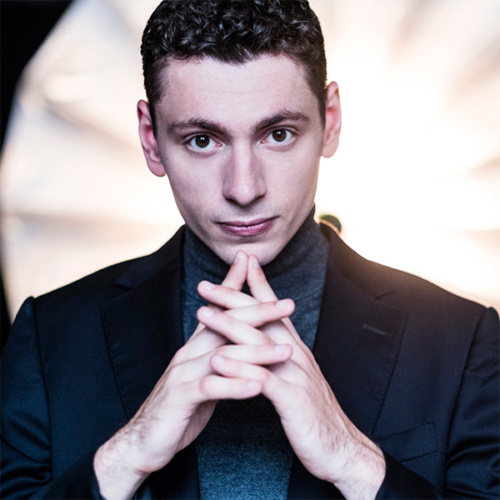
Dominic Cheli
Dominic Cheli’s playing has been described as “spontaneous yet perfect, the best of how a young person can play.” (Symphony Magazine) His rapidly advancing career included his Walt Disney Concert Hall Debut with legendary Conductor Valery Gergiev where Dominic was described as “mesmerizing, (he) transfixed the audience…his fingers were one with each key.” (LA Times) He gave his Carnegie Hall Recital Debut this past season, and recently recorded his second CD on the Naxos label of the music of Liszt/Schubert. In July 2017, Cheli’s first CD, featuring the music of Muzio Clementi and released by Naxos, was hailed as “definitive performances, that match splendid playing with an appreciation of Clementi’s diverse, classically based style.” Also in 2017, Dominic was named 1st prize winner of the Concert Artists Guild Competition in New York City.
Winner of the 2017 Music Academy of the West Concerto Competition, Dominic performed Prokofiev’s 2nd Piano concerto with Conductor, Composer, and MacArthur “Genius Grant” recipient, Matthew Aucoin. Described as a “barnstorming Goliath” Mr. Cheli’s performance of Prokofiev’s 2nd concerto “roared like a locomotive, shot firebrands of energy this way and that, while the piano strained to keep in one piece under the thrall of Cheli’s glorious technique.” (Santa Barbara Voice Magazine)
A native of St. Louis, Dominic has performed with the Metropolitan Orchestra of St. Louis, as well as orchestras all across the country and abroad including the San Diego Symphony, DuPage Symphony, Columbus Symphony, Princeton Symphony, Colburn Orchestra, Virginia Symphony, Adrian Symphony, Nordwestdeutsche Philharmonie (Germany), and the Great Falls Symphony. He has worked with Conductors such as Valery Gergiev, Yaniv Dinur, Markus Huber, Rossen Milanov, Arthur Fagen, Bruce Kiesling, Matthew Aucoin, and many others. Dominic recently debuted at several major festivals across the United States including the Ravinia Festival, Mostly Mozart Festival, and the Virginia Arts Festival. Upcoming engagements included appearances with the Seattle Symphony, a re-invitation to the Ravinia Festival, his debut at Alice Tully Hall, and recitals in Philadelphia, Washington D.C, and New York City.
Committed to engaging with his surrounding community, Dominic regularly performs at high schools, retirement homes, and gives both masterclasses and lectures for his younger audiences. Upon invitation, he has performed with Paul Coletti at ViolaFest in Los Angeles for younger students, and “Baby Got Bach” with Pianist Orli Shaham at Le Poisson Rouge in NYC. Dominic has performed as an artist for Project: Music Heals Us, a non-profit organization that presents interactive classical music performances to diverse audiences in order to provide encouragement, education, and healing with a focus on elderly, disabled, rehabilitating, incarcerated, and homeless populations.
In 2018, Dominic was invited by his mentor, Andre-Michel Schub, to perform at the Virginia Arts Festival, both as a soloist and collaborator, in concerts centered around the music of Mozart. They collaborated in Mozart’s Double and Triple Piano Concertos with the Virginia Symphony, as well as in recital where “Cheli delivered one brilliant performance…it was a dazzling moment by a pianist whose name is destined for Schub-ian heights.” (Virginia Gazette) Mr. Cheli has studied at the Manhattan School of Music, Yale University, and the Colburn School. Andre-Michel Schub, Peter Frankl, Fabio Bidini, Zena Ilyashov, and Sylvia Rosenberg are individuals who have been especially influential on his development as an artist.
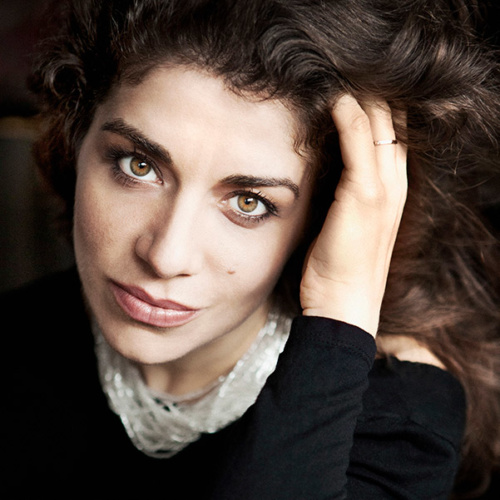
Inna Faliks
“Adventurous and passionate” (The New Yorker)
Ukrainian-born American Pianist Inna Faliks has made a name for herself through her commanding performances of standard piano repertoire, as well as genre-bending interdisciplinary projects, and inquisitive work with contemporary Composers. After her acclaimed teenage debuts at the Gilmore Festival and with the Chicago Symphony Orchestra, she has performed on many of the world’s great stages, with numerous orchestras and in solo appearances. Faliks is currently Professor of Piano and Head of Piano at UCLA.
Critics praise her “courage to take risks, expressive intensity and technical perfection” (General Anzeiger, Bonn), “remarkable insight” (Audiophile audition) “poetry and panoramic vision” (Washington Post), “riveting passion, playfulness” (Baltimore Sun) and “signature blend of lithe grace and raw power” (Lucid Culture). Her October 2014 all-Beethoven CD release on MSR classics drew rave reviews: the disc’s preview on WTTW called Faliks “High priestess of the piano, concert pianist of the highest order, as dramatic and subtle as a great stage actor.” Her previous, critically acclaimed CD on MSR Classics, Sound of Verse, was released in 2009, featuring the music of Boris Pasternak, Rachmaninoff and Ravel. Her discography also includes a recital recording for the Yamaha Disklavier label, Chopin solo and cello sonatas recording with Cellist Wendy Warner, “Polonaise-Fantasie, Story of a Pianist” for Delos – an autobiographical monologue-recital of short piano works from Bach and Chopin to Gershwin and Carter.
Highlights of the recent seasons include performances in Ravinia Festival and the National Gallery in DC, recital tours of China, with appearances in all the major halls such as Beijing Center for Performing Arts, Shanghai Oriental Arts Theater and Tianjin Grand Theater, as well as acclaimed performances at the Festival Intenacional de Piano in Mexico, in the Fazioli Series in Italy and in Israel’s Tel Aviv Museum, at Portland Piano Festival and with the Camerata Pacifica, with the modern dance troupe Bodytraffic at the Broad Stage Santa Monica, and Jacaranda Series in Los Angeles, where she performed Rzewski’s The People United Will Never Be Defeated.
Faliks has been featured on WQXR, WNYC, WFMT and many international television broadcasts, and has performed in many other major venues, such as Carnegie Hall’s Weill Concert Hall, Metropolitan Museum of Art, Paris’ Salle Cortot, Chicago’s Symphony Center, Moscow’s Tchaikovsky Hall and in many important festivals such as Verbier, Newport, Portland International, Music in the Mountains, Mondo Musica Cremona, Brevard, Taos, International Keyboard Festival in NYC, Bargemusic, and Chautauqua. She is regularly engaged as a concerto soloist nation-wide.
Faliks is the founder and curator of the of the Manhattan Arts Council award winning poetry-music series Music/Words, creating performances in collaboration with distinguished poets. This has been described as “surreal, impactful, and relevant” (Lucid Culture). Her long-standing relationship with WFMT radio has led to multiple broadcasts of Music/Words, which she had produced alongside some of the nation’s most recognized poets in performances throughout the United States.
An artist known for his versatility, Faliks is equally at home with standard repertoire, rare and new music, and interdisciplinary performances. She recently co-starred with Downton Abbey star Lesley Nicol in “Admission – One Shilling,” a play for Pianist and Actor about the life of Dame Myra Hess, the great British Pianist. Most recently, she is touring with her autobiographical recital-monologue, “Polonaise-Fantasie, the Story of a Pianist” throughout the US and Canada.
Constantly in dialogue with today’s Composers, she has had works composed for her by Timo Andres, Billy Childs, Richard Danielpour, Paola Prestini, Ljova, Clarice Assad, Peter Golub, and many more. She was the winner of many prestigious competitions, including Hilton Head International Piano Competition and International Pro Musicis Award.
Faliks is internationally in demand as an Artist Teacher, and frequently adjudicates competitions gives masterclasses and travels to Artist Residencies in major conservatories and universities around the world. In March 2019, Faliks was Artistic Director of Classical Music for YoungArts LA, programming and workshopping a program with the nation’s top young musicians and Composers, as well as directing a number of panels and masterclasses. As a Writer, she has been published by LA Times and Washington Post.
Inna Faliks is a Yamaha Artist.
Photo Credit: Lisa Marie Mazzucco
References
- 1. "Pianist Salary". ZipRecruiter. published: Nov 14, 2024. retrieved on: Nov 21, 2024

